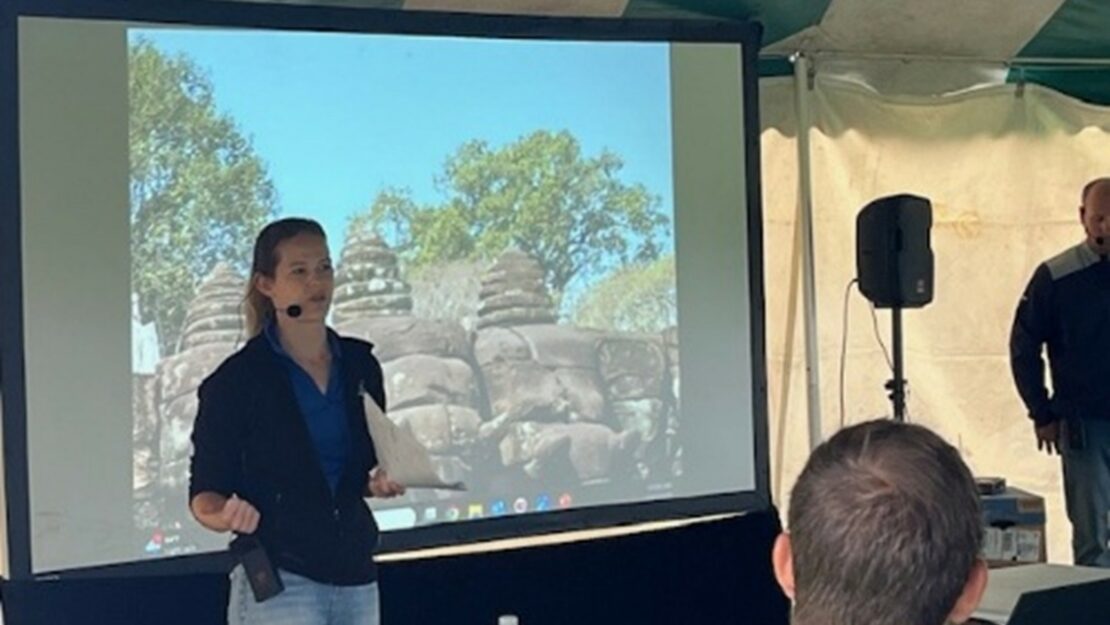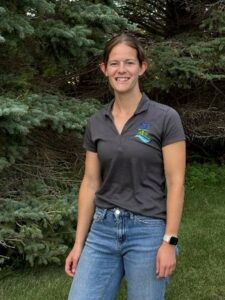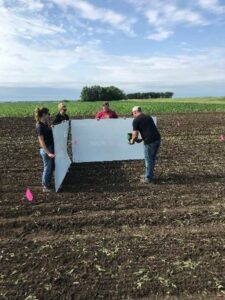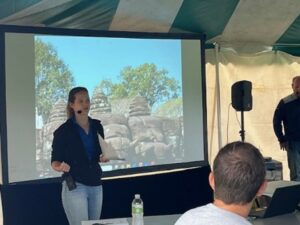We’re the Land of 10,000 Lakes; Let’s Act Like it!

By Adriene Matthews, Agriculture and Outreach Specialist Individual Placement Member / AmeriCorps Member placed at Cottonwood SWCD.
There are several different types of jobs in conservation in America. Wildlife and marine biologists, wildlife technicians, environmental scientists, and foresters, just to name a few. This article will highlight the jobs in conservation that may be overlooked, or people have never heard of before, me included. In this series I will touch on the variety of jobs in conservation that I work closely with in Minnesota.
Hi, my name is Adriene Matthews, and I am an agriculture outreach specialist for Conservation Corps Minnesota & Iowa in the town of Windom, in Southwest Minnesota. I have had the wonderful opportunity to work alongside so many different organizations and agencies, from Minnesota Pollution Control Agency (MPCA), Department of Natural Resources (DNR), Natural Resources Conservation Service (NRCS), Soil and Water Conservation Districts (SWCD), and Minnesota Department of Agriculture (MDA). I was able to learn about all the different ways these organizations are helping with conservation of land, air and water, in Minnesota.
August was Water Quality month! To showcase the wonderful work that Minnesota is doing to protect its water quality, I have interviewed two certification specialists who work with MN Agriculture Water Quality Certification Program (MAWQCP). MAWQCP is a voluntary program for farmers and agricultural landowners to take lead in implementing conservation practices that protect our water.

Danielle Evers, the Area 5 Certification Specialist, went to college at SDSU to get a bachelor’s degree in Agricultural Sciences. In studying for this degree, she needed to take internships during the summer. Danielle was able to get a summer internship with CCMI at her local SWCD in Cottonwood County. Danielle grew up in Windom, where her dad and grandpa farmed, so she knew what Soil and Water offices did. Looking for something a little bit different after she graduated college, Danielle went on to get a job at a co-op in South Dakota, as an agronomist. The NCBA CLUSA, state the importance of farm co-ops ‘In a farmer-owned co-op, like-minded food producers help build a better local economy in the communities they serve.’ After about 8 months working at the co-op, Danielle was approached by her former Soil and Water office coworkers about a job opportunity with a new program. MAWQCP was looking to hire a certification specialist in the Southwest MN area, and Kay Gross (Cottonwood SWCD, district manager) thought Danielle might be a perfect fit. Coming up on her 10th year as a Certification Specialist, Danielle thoroughly enjoys her job and is excited to continue her work for years to come.

As a Certification Specialist Danielle speaks with a wide range of landowners and assesses their farming operation to determine its potential water quality risk. Certification Specialists go over Nitrogen and Phosphorus management, tillage use, pest management, irrigation/ drainage, and any conservation practices that have been implemented on their fields. The assessment tool will score a landowner’s practices out of 10 and if their final score is an 8.5 or higher, then they are eligible for certification. A few misconceptions that Danielle wanted to point out, are that while water quality is in the program’s name, she does not do any water quality testing. She works more on the front end, by talking to landowners and looking over their practices. Another misconception is that MAWQCP is a regulatory program, it isn’t. This program is voluntary, and landowners have the option to not continue with the certification process or choose not to recertify when their 10 year certification period is over. MAWQCP plays a major role in conservation, in the agricultural realm. As of 2023, the Bureau of Economic Analysis found that roughly $1.537 trillion was contributed to the U.S. gross domestic product because of agriculture, food, and related industries. Danielle says that MAWQCP fills a huge need in agriculture by connecting producers and building relationships in order to sell and implement more conservation on the ground.
One of the biggest things to know, even if you are not in the agriculture field, is that landowners want to make a living and have productive land that can be farmed for generations to come. Programs like MAWQCP, and organizations such as SWCD, MDA, Pheasants Forever, and NRCS, help to point them in the right direction of conservation practices that they can do that make the most sense for their farming operation. As of June; 2025; 1,653 farms and 1,128,078 acres have been certified, and 7,760 new best management practices have been implemented in MN, thanks to MAWQCP.
MN is home to over 10,000 lakes, and many people want to keep it that way. Programs such as MAWQCP are doing their part to protect the rivers, streams, and lakes in MN for future generations to be able to enjoy them.
